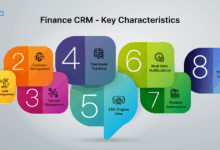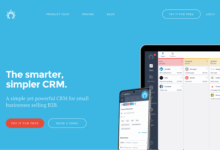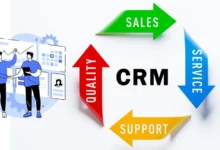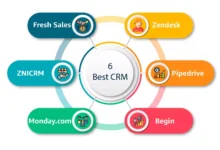Top Cloud-Based CRM Platforms: A Comprehensive Guide
Top Cloud-Based CRM Platforms are revolutionizing how businesses manage customer relationships. This guide explores the leading platforms, comparing their features, pricing, and security measures. We’ll delve into sales automation, customer service capabilities, and marketing automation tools, providing a comprehensive overview to help you choose the best CRM for your needs. Understanding the nuances of cloud-based CRM deployment models—SaaS, PaaS, and IaaS—is crucial for informed decision-making, and we will clarify these distinctions.
From streamlining sales processes and enhancing customer service to optimizing marketing campaigns, cloud-based CRMs offer a suite of powerful tools to boost efficiency and profitability. This analysis will provide a clear picture of the market leaders, highlighting their strengths and weaknesses to help you navigate the selection process effectively. We’ll also consider crucial aspects like scalability, customization options, and data security, ensuring a holistic understanding of the landscape.
Introduction to Cloud-Based CRM Platforms
Cloud-based Customer Relationship Management (CRM) platforms represent a significant shift in how businesses manage their interactions with customers. They leverage the power of the internet and cloud computing to provide accessible, scalable, and cost-effective solutions for managing customer data and interactions. This approach contrasts sharply with traditional on-premise CRM systems, which require significant upfront investment in hardware and software, as well as ongoing maintenance and IT support.
Cloud-based CRM systems offer several compelling advantages over their on-premise counterparts. The most significant benefit is reduced upfront cost. Businesses avoid the substantial expense of purchasing and maintaining servers, software licenses, and dedicated IT infrastructure. Scalability is another key advantage; cloud-based systems can easily adapt to changing business needs, allowing for seamless expansion or contraction of resources as required. Accessibility is enhanced, with authorized users able to access customer data and applications from anywhere with an internet connection, promoting increased collaboration and efficiency. Finally, regular updates and maintenance are handled by the cloud provider, freeing up internal IT resources and ensuring the system remains current and secure.
Key Features of Cloud-Based CRM Platforms
Most leading cloud-based CRM platforms share a core set of features designed to streamline customer interaction management. These typically include contact management (organizing and storing customer information), lead management (tracking potential customers), sales force automation (automating sales processes), marketing automation (automating marketing campaigns), customer service and support tools (managing customer inquiries and resolving issues), reporting and analytics (providing insights into customer behavior and sales performance), and integration capabilities (connecting with other business applications). Many platforms also offer mobile accessibility, allowing users to access and manage customer data on the go. The specific features offered and their depth of functionality can vary significantly between platforms, catering to the diverse needs of businesses of all sizes and industries.
Comparison of CRM Deployment Models
Choosing the right deployment model is crucial for optimizing the effectiveness and cost-efficiency of a CRM system. Different models offer varying levels of control, responsibility, and cost. The three primary models are Software as a Service (SaaS), Platform as a Service (PaaS), and Infrastructure as a Service (IaaS).
| Deployment Model | Vendor Responsibility | Customer Responsibility | Cost Model |
|---|---|---|---|
| SaaS (Software as a Service) | Software, infrastructure, updates, security | Data, user management, customization (limited) | Subscription-based, typically recurring monthly or annual fees |
| PaaS (Platform as a Service) | Infrastructure, operating system, middleware | Software development, data, customization, security (some aspects) | Subscription-based, often tiered based on resource consumption |
| IaaS (Infrastructure as a Service) | Hardware infrastructure (servers, storage, networking) | Operating system, software, data, security, updates | Pay-as-you-go or subscription-based, typically charged based on resource usage |
Top Platforms
Choosing the right cloud-based CRM can significantly impact a business’s efficiency and growth. This section provides an overview and comparison of five leading platforms, highlighting their strengths, target audiences, and pricing models to aid in informed decision-making.
Leading Cloud-Based CRM Platforms: An Overview
Five leading cloud-based CRM platforms are Salesforce Sales Cloud, Microsoft Dynamics 365, HubSpot CRM, Zoho CRM, and SAP Customer Experience. Each platform caters to different business needs and sizes, offering a range of features and functionalities.
Target Audience and Key Strengths
Each platform targets a specific audience based on its features and pricing. Salesforce Sales Cloud, for example, is known for its robust features and scalability, making it ideal for large enterprises and complex sales processes. Microsoft Dynamics 365 is a strong choice for businesses already invested in the Microsoft ecosystem, offering seamless integration with other Microsoft products. HubSpot CRM, with its focus on inbound marketing, is well-suited for small and medium-sized businesses (SMBs) seeking to improve lead generation and nurturing. Zoho CRM offers a comprehensive, yet affordable solution for businesses of all sizes, particularly those valuing cost-effectiveness. Finally, SAP Customer Experience is a powerful option for large enterprises requiring integrated solutions across various customer touchpoints, particularly within complex supply chains.
Pricing Models: A Comparison
The pricing models for these platforms vary considerably. Salesforce Sales Cloud typically utilizes a subscription-based model with pricing tiered according to the number of users and features required. This often translates to a higher initial investment, but offers significant scalability. Microsoft Dynamics 365 follows a similar subscription model, with pricing varying based on the modules chosen and the number of users. HubSpot CRM offers a freemium model, providing a basic version at no cost and offering progressively more features at higher subscription tiers. Zoho CRM also offers a tiered subscription model with various plans catering to different business needs and budgets. SAP Customer Experience usually involves a more complex pricing structure, often negotiated on a case-by-case basis and dependent on the specific implementation requirements.
Key Features Comparison
The following table summarizes the key features of each platform. Note that feature availability and depth can vary within each platform’s pricing tiers.
| Feature | Salesforce Sales Cloud | Microsoft Dynamics 365 | HubSpot CRM | Zoho CRM | SAP Customer Experience |
|---|---|---|---|---|---|
| Sales Automation | Extensive, including lead management, opportunity tracking, forecasting | Robust, integrates well with other Microsoft products | Good, focused on inbound sales and lead nurturing | Comprehensive, covers various sales processes | Highly advanced, supporting complex sales cycles and large enterprises |
| Marketing Automation | Powerful, with advanced features for email marketing, campaign management, etc. | Strong integration with Microsoft marketing tools | Excellent, a core strength of the platform | Good, provides essential marketing automation tools | Sophisticated, with capabilities for personalized customer journeys |
| Customer Service Features | Comprehensive, including case management, knowledge base, and service cloud | Robust, integrating with other Microsoft service tools | Good, with features for ticketing, live chat, and email support | Solid, provides essential tools for managing customer support | Advanced, supporting omnichannel customer service and complex service processes |
Platform Features Deep Dive: Sales Automation
Sales automation is a cornerstone of modern CRM systems, significantly boosting efficiency and productivity. By automating repetitive tasks, these platforms free up sales teams to focus on building relationships and closing deals. This section delves into the sales automation capabilities of leading cloud-based CRM platforms, examining their integration options, reporting dashboards, lead management tools, and sales pipeline visualization features.
Sales Automation Capabilities
Top CRM platforms offer a range of sales automation features designed to streamline the sales process. These commonly include automated email sequences, lead scoring and routing, appointment scheduling, and task management. For example, Salesforce allows users to create complex automated workflows that trigger specific actions based on predefined criteria, such as sending a follow-up email after a meeting or automatically assigning leads to the appropriate sales representative. Similarly, HubSpot offers a robust suite of sales automation tools, including its sales hub, which provides features like email tracking, meeting scheduling, and deal management. These features contribute to improved sales team performance and increased sales conversion rates.
Integration with Other Business Applications
Seamless integration with other business applications is crucial for maximizing the value of a CRM system. Leading platforms typically offer robust API integrations and pre-built connectors for popular tools like marketing automation platforms (e.g., Marketo, Pardot), email marketing services (e.g., Mailchimp, Constant Contact), and communication platforms (e.g., Slack, Microsoft Teams). Salesforce, for instance, boasts a vast AppExchange marketplace with thousands of third-party integrations, allowing businesses to tailor their CRM to their specific needs. HubSpot, on the other hand, emphasizes a more integrated ecosystem, with its various hubs (sales, marketing, service) working together seamlessly. This interoperability ensures data consistency and facilitates a more holistic view of the customer journey.
Reporting and Analytics Dashboards
Effective sales performance tracking relies on comprehensive reporting and analytics capabilities. Leading CRM platforms provide customizable dashboards that visualize key sales metrics, such as revenue, conversion rates, deal closure times, and sales team performance. Salesforce offers sophisticated reporting tools, including custom reports, dashboards, and analytics, allowing users to gain deep insights into their sales data. HubSpot’s reporting features are similarly robust, providing detailed visualizations of sales activity and performance. These dashboards allow sales managers to identify trends, pinpoint areas for improvement, and make data-driven decisions to optimize sales strategies. For example, a sales manager might use a dashboard to track the performance of individual sales representatives, identify underperforming products, or analyze the effectiveness of different marketing campaigns.
Lead Management and Sales Pipeline Visualization
Efficient lead management and sales pipeline visualization are essential for effective sales processes. Top CRM platforms provide tools to manage leads throughout the sales cycle, from initial contact to closed-won deals. These tools often include lead scoring, lead assignment, and lead nurturing capabilities. Salesforce’s lead management features allow for detailed lead tracking and segmentation, enabling sales teams to prioritize high-potential leads and personalize their outreach. HubSpot’s sales pipeline visualization tools provide a clear and concise overview of the sales process, allowing sales teams to track the progress of deals and identify potential bottlenecks. This visual representation enhances team collaboration and allows for proactive intervention to ensure deals progress smoothly. A clear visualization, for instance, can quickly highlight deals at risk of stalling, allowing for timely intervention and improved closing rates.
Platform Features Deep Dive: Customer Service and Support
Effective customer service is paramount for any business, and cloud-based CRM platforms offer a range of tools to enhance this crucial aspect of operations. The features available vary between platforms, impacting a company’s ability to manage interactions, resolve issues, and foster positive customer relationships. This section will examine the customer service capabilities of several leading cloud-based CRM platforms.
Customer Service Features Comparison
Each platform offers a distinct set of customer service features designed to streamline interactions and improve response times. These features go beyond basic email and phone support, incorporating advanced tools for managing customer inquiries and building knowledge bases. The following analysis details the key features of several prominent platforms.
Customer Communication Channels
Successful customer service relies on seamless communication across various channels. Modern customers expect to interact with businesses through their preferred methods, be it email, phone, live chat, or social media. The platforms discussed below offer varying degrees of support for these diverse communication channels, influencing their overall effectiveness in managing customer interactions.
Knowledge Base and Self-Service Options
A robust knowledge base and self-service options significantly reduce the burden on customer support teams by empowering customers to find answers independently. This section compares the knowledge base features offered by different platforms, highlighting their capabilities in creating, managing, and delivering self-service content to customers. The ease of use and comprehensiveness of these resources directly impact customer satisfaction and support efficiency.
Customer Support Options Summary
The following table summarizes the primary customer support options provided by several leading cloud-based CRM platforms. The availability and accessibility of these options are critical factors to consider when choosing a platform.
| Platform | Phone Support | Email Support | Live Chat Support | Other Support Options |
|---|---|---|---|---|
| Salesforce Service Cloud | Yes, typically tiered based on plan | Yes, integrated within the platform | Yes, often integrated with other communication tools | Community forums, knowledge base articles, case management system |
| Microsoft Dynamics 365 Customer Service | Yes, typically tiered based on plan | Yes, integrated within the platform | Yes, often integrated with other communication tools | Knowledge base, self-service portal, Omnichannel for Customer Service |
| Zendesk | Often available as an add-on or higher-tiered plan | Yes, core functionality of the platform | Yes, a core feature | Community forums, knowledge base, app integrations for various communication channels |
| HubSpot Service Hub | Often available as an add-on or higher-tiered plan | Yes, core functionality of the platform | Yes, a core feature | Knowledge base, ticketing system, integrations with various communication channels |
| Freshdesk | Often available as an add-on or higher-tiered plan | Yes, core functionality of the platform | Yes, a core feature | Knowledge base, self-service portal, numerous integrations |
Platform Features Deep Dive: Marketing Automation
Marketing automation is a crucial component of any successful CRM strategy, streamlining repetitive tasks and enabling more personalized customer interactions. Top cloud-based CRM platforms offer robust marketing automation capabilities, integrating seamlessly with sales and customer service functions to provide a holistic view of the customer journey. This section will delve into the specific marketing automation features of leading platforms, highlighting their strengths and weaknesses in areas like email marketing, campaign management, lead nurturing, and customer segmentation.
Email Marketing Capabilities
The leading CRM platforms provide comprehensive email marketing functionalities. For instance, Salesforce Marketing Cloud allows for sophisticated email creation, A/B testing, and detailed performance tracking. HubSpot’s email marketing tools are known for their user-friendly interface and robust automation features, facilitating personalized email sequences based on user behavior. Microsoft Dynamics 365 Marketing offers similar capabilities, focusing on integrating email campaigns directly with sales and customer service data for a cohesive customer experience. These platforms enable the creation of targeted email campaigns based on various criteria, including demographics, purchase history, and website activity. They also typically offer features such as automated email workflows, triggered emails based on specific events, and personalized email content.
Lead Nurturing and Customer Segmentation
Effective lead nurturing and customer segmentation are key to successful marketing automation. Salesforce Marketing Cloud utilizes sophisticated segmentation tools to divide audiences based on numerous factors, enabling the delivery of tailored content to specific customer groups. HubSpot’s workflow automation allows for the creation of personalized email sequences that guide leads through the sales funnel, providing relevant information at each stage. Dynamics 365 Marketing employs similar strategies, leveraging customer data to create targeted marketing campaigns and nurture leads with personalized content. For example, a platform might automatically send a welcome email to new subscribers, followed by a series of emails providing valuable content and offers, ultimately leading to a sales conversion. Segmentation allows businesses to tailor their messaging to specific customer needs and interests, resulting in higher engagement and conversion rates.
Integration with Marketing Automation Tools
Most top CRM platforms offer robust integration capabilities with other marketing automation tools. Salesforce, for example, integrates with a wide range of marketing automation platforms, including Marketo and Pardot. HubSpot, being a comprehensive marketing platform itself, integrates seamlessly with its own suite of tools, as well as other third-party applications. Microsoft Dynamics 365 Marketing also offers extensive integration options, enabling businesses to connect their CRM data with various marketing platforms and tools. These integrations allow businesses to consolidate their marketing data in one central location, providing a comprehensive view of their marketing performance and enabling more efficient campaign management. This streamlined approach helps reduce data silos and enhances overall marketing efficiency.
Marketing Analytics and Reporting
Comprehensive marketing analytics and reporting are essential for measuring the success of marketing campaigns.
| Platform | Campaign Performance Metrics | Lead Scoring & Attribution | Real-time Dashboards & Reporting |
|---|---|---|---|
| Salesforce Marketing Cloud | Open rates, click-through rates, conversion rates, email deliverability | Provides robust lead scoring models and multi-touch attribution | Offers customizable dashboards and real-time reporting on key metrics |
| HubSpot | Comprehensive email analytics, website traffic data, lead generation metrics | Provides lead scoring and attribution models based on various interactions | Offers a range of pre-built and customizable dashboards and reports |
| Microsoft Dynamics 365 Marketing | Email performance, website analytics, social media engagement | Supports lead scoring and attribution, integrating with sales data | Provides interactive dashboards and customizable reports for campaign performance |
Security and Integration Considerations
Choosing a cloud-based CRM involves careful consideration of data security and the platform’s ability to integrate with your existing business systems. A robust security posture is paramount, and seamless integration streamlines workflows and improves data consistency. This section examines these crucial aspects for leading CRM platforms.
Data Security Measures
Each leading CRM provider employs a multi-layered approach to data security. This typically includes data encryption both in transit and at rest, using protocols like TLS/SSL and robust encryption algorithms. Access controls, implemented through role-based permissions and multi-factor authentication (MFA), restrict access to sensitive data based on user roles and responsibilities. Regular security audits and penetration testing help identify and address vulnerabilities proactively. Furthermore, many platforms leverage advanced threat detection systems and employ measures to prevent and respond to data breaches. Specific examples include Salesforce’s Shield platform, offering encryption, event monitoring, and data loss prevention capabilities, and Microsoft Dynamics 365’s security features, which include data encryption, access controls, and compliance certifications.
Integration Capabilities with Other Business Applications
Seamless integration with existing business systems is crucial for efficient data flow and operational effectiveness. Leading CRM platforms offer robust integration capabilities with various applications, including Enterprise Resource Planning (ERP) systems like SAP and Oracle, accounting software such as QuickBooks and Xero, and marketing automation platforms like Marketo and HubSpot. These integrations often leverage APIs (Application Programming Interfaces) or pre-built connectors to facilitate data exchange and synchronization. For instance, Salesforce offers a comprehensive AppExchange with numerous pre-built integrations, while Microsoft Dynamics 365 provides robust integration capabilities with Microsoft’s ecosystem and other third-party applications through its Power Platform.
API Capabilities and Documentation
APIs are the backbone of integration, allowing developers to build custom applications and integrate the CRM with other systems. The quality and comprehensiveness of API documentation are critical for developers. Leading platforms provide well-documented RESTful APIs with clear specifications, examples, and SDKs (Software Development Kits) in various programming languages. Comprehensive documentation ensures ease of use and accelerates the development process. For example, Salesforce’s REST API is widely recognized for its extensive documentation and robust functionality, while Microsoft Dynamics 365 also offers a well-documented API for developers.
Compliance Certifications
Compliance certifications demonstrate a platform’s commitment to data security and adherence to industry standards. Leading CRM platforms often hold certifications such as ISO 27001 (information security management), SOC 2 (System and Organization Controls), HIPAA (Health Insurance Portability and Accountability Act), and GDPR (General Data Protection Regulation), depending on their target market and data handling practices. These certifications provide assurance to customers that the platform meets stringent security and privacy requirements. The specific certifications held vary across platforms; however, verification of these certifications on a vendor’s website is crucial before selecting a CRM solution.
Scalability and Customization
Choosing the right cloud-based CRM requires careful consideration of scalability and customization options to ensure the platform can adapt to your business’s evolving needs and growth trajectory. A platform’s ability to scale efficiently and be tailored to specific requirements is crucial for long-term success and ROI. This section explores the scalability and customization capabilities of leading cloud-based CRM platforms.
The scalability of a CRM platform refers to its capacity to handle increasing amounts of data, users, and transactions without significant performance degradation. Customization, on the other hand, involves adapting the platform’s functionalities and features to align with specific business processes and workflows. Deployment options, such as cloud, on-premise, or hybrid, also impact scalability and customization possibilities.
Scalability Across Different Platforms
Different CRM platforms offer varying levels of scalability. Some are designed for small businesses and may struggle with rapid growth, while others are built to handle the demands of large enterprises with millions of records and thousands of users. Factors influencing scalability include the platform’s architecture, infrastructure, and underlying technology. For example, a platform utilizing a microservices architecture is generally more scalable than one with a monolithic architecture.
- Salesforce: Salesforce is known for its exceptional scalability, capable of handling massive data volumes and user bases. Its multi-tenant architecture and robust infrastructure ensure high availability and performance even under heavy load. Salesforce also offers various deployment options, including its own cloud infrastructure, allowing businesses to scale resources as needed.
- Microsoft Dynamics 365: Microsoft Dynamics 365 also provides excellent scalability, leveraging Microsoft’s Azure cloud infrastructure. It offers flexible deployment options and can be scaled to accommodate the growth of both small and large enterprises. Its integration with other Microsoft products further enhances its scalability and usability.
- HubSpot: HubSpot, while suitable for many businesses, might reach scalability limitations for extremely large enterprises. While it scales well for many businesses, very large organizations might require more robust infrastructure solutions than HubSpot’s standard offering.
Customization Options and Deployment Models
Customization options are crucial for aligning the CRM with specific business processes. This can involve configuring existing features, developing custom applications, or integrating with third-party tools. Deployment options also influence customization. Cloud deployments offer greater flexibility, while on-premise deployments allow for more extensive customization but require more IT resources.
- Customization Methods: Many platforms offer a range of customization options, including workflow automation, custom fields and objects, API integrations, and app development. Salesforce, for instance, provides a powerful platform for building custom applications using its Apex programming language and Force.com platform. Microsoft Dynamics 365 allows customization through its SDK and various extensions. HubSpot offers a range of customization options through its extensive app marketplace and its own customization tools.
- Deployment Models: Cloud deployments offer scalability and accessibility, while on-premise deployments offer greater control but require significant IT investment. Hybrid deployments combine aspects of both, offering flexibility and control. The choice of deployment model significantly impacts customization possibilities and overall cost.
Industry-Specific Customization Examples
CRM platforms can be tailored to meet the unique needs of various industries. Customization ensures the platform effectively supports industry-specific processes and data requirements.
- Healthcare: A healthcare provider might customize a CRM to manage patient records, track appointments, and comply with HIPAA regulations. This could involve integrating with electronic health record (EHR) systems and implementing robust security measures.
- Financial Services: A financial institution might customize its CRM to manage customer accounts, track transactions, and comply with regulatory requirements. This might involve integrating with financial data systems and implementing features for risk management and compliance.
- Manufacturing: A manufacturing company might customize its CRM to track production orders, manage inventory, and coordinate with suppliers. This could involve integrating with enterprise resource planning (ERP) systems and implementing features for supply chain management.
Closing Summary
Selecting the right cloud-based CRM platform is a significant decision impacting various aspects of your business. This guide has provided a detailed comparison of leading platforms, highlighting their key features, strengths, and weaknesses across sales automation, customer service, and marketing automation. By considering factors such as scalability, security, integration capabilities, and pricing models, businesses can make an informed choice that aligns with their specific needs and future growth trajectory. Remember to carefully evaluate your current and future requirements before committing to a particular platform.





